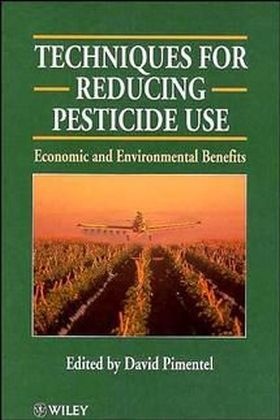Read more
Informationen zum Autor David Pimentel is the author of Techniques for Reducing Pesticide Use: Economic and Environmental Benefits, published by Wiley. Klappentext Techniques for Reducing Pesticide Use Economic and Environmental Benefits Edited by David Pimentel Cornell University, USA Pest insects, plant pathogens, and weeds destroy approximately 40% of all potential food production worldwide. This major food loss occurs despite the application of 2.5 million tons of pesticides at a cost of more than $25 billion each year. Pesticides provide many important benefits in pest control, returning about $4 for every $1 invested. However, this cost/benefit ratio does not include the annual environmental and public health costs of using pesticides which include 3 million human poisonings and 220,000 deaths annually worldwide. With more than 2 billion people malnourished in the world, a major effort is required to reduce the continuing 40% loss of crops to pests. With a relatively small investment in research and extension, this crop destruction can be reduced. Technologies now exist to reduce pesticide use by at least 50%, without reducing crop yields or substantially altering the 'cosmetic standards' of fresh fruit and vegetables. Reducing pesticide use will lower the economic costs of pest control, protect public health, and improve the stability of the natural environment. The various pest management techniques available are discussed in all chapters of this book. It will help governmental leaders, scientists and the public to understand that many strategies, if implemented, will improve pest management, maintain crop yields, and reduce pesticide use. Zusammenfassung Around 2.5 million tons of pesticide are used every year. This volume outlines the techniques for reducing pesticide use internationally, through using integrated pesticide management, and from this to assess the environmental and economic benefits that such a reduction will bring. Inhaltsverzeichnis Pest Management in Agriculture; Pests, Pesticides, and the Environment; Environmental Ethics and Pesticide Use; Environmental and Socio-Economic Costs of Pesticide Use; Pesticide Use in Swedish Agriculture; The Case of a 75% Reduction; Role of Biological Control and Transgenic Crops in Reducing Use of Chemical Pesticides for Crop Protection; Host Plant Resistance to insect Pests; Disease Resistance in Plants; What is Durable Resistance, A General Outline; \benefits of Minimum Pesticide Use in Insect and Mite Control in Orchards; Cultural Controls for Crop Diseases; Cultural Controls for Weeds; IPM Practices for Reducing Use in US Field Crops; IPM Techniques for Reducing Fungicide Use in Field Crops; IPM Practices for Reducing Insecticide in US Fruit Crops; IPM Practices for Reducing Fungicide Use in Fruit Crops; Reducing Insecticide, Fungicide, and Herbicide Use on Vegetables and Reducing Herbicide Use on Fruit Crops; IPM Techniques for Greenhouse Crops; Environmental Aspects of 'Cosmetic Standards' of Foods and Pesticides....

